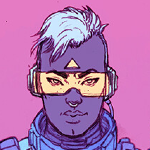|
Kaishai posted:Semicolons have another, rather neat purpose that isn't often mentioned. You know how you'll usually separate items in a list with a comma? "I went to Wal-Mart and bought bread, milk, cheese, and simulated emeralds," that kind of thing. Usually that works fine, but it gets messy when individual items in the list contain commas. If you tell me you invited Dan, a scientist, Margaret, a welder, and Vinny to a party, how am I supposed to know whether you invited three people or five? I just ran into this yesterday and got tripped up on the last part with 'a welder; and Vinny' because it wandered into Oxford comma territory and I didn't know what the hell the semicolon rules were there.
|
|
|
|

|
| # ? May 29, 2024 17:15 |
|
crabrock posted:Pen/pencil situation I think it's all about what you can get away with. Will your audience know that its not factual? Is it something they can forgive because of its lyricism or whimsy? Is it so important to the story that people will even spend enough time lingering on it to worry? I was in a room where someone read an otherwise very nice flash fiction piece that started with words like "Picture a rabbit, a mangy hare in fact." I was willing to forgive this being very inaccurate, because it sounded quite nice and understood that the difference between a rabbit and a hare didn't really matter to the story, and also that I probably couldn't tell a hare without a rabbit to compare it to. Other people in the audience though thought the piece was completely ruined. The mistake in this piece was unintentional, but I think it demonstrates what I mean.
|
|
|
|
newtestleper posted:I think it's all about what you can get away with. Will your audience know that its not factual? Is it something they can forgive because of its lyricism or whimsy? Is it so important to the story that people will even spend enough time lingering on it to worry? Yeah, I'm with the general consensus on this: if you do the rabbit/hare thing and include something you know is objectively wrong in a narrative that isn't clearly informed by the main character's perspective, you're highly likely to get people hung up on it in a really annoying way. If you frame it as the meaningful but incorrect assumption of a character, yeah, sure- you'll still get people going "UH, EXCUSE ME" but most people will understand implicitly that your characters can make mistakes and have harmless misunderstandings about the world without you sharing them. (Example: I once had a character say something ignorant but absolutely dead-on believable for a guy of his age and personality, and only one person tried to take me up on that offhand comment as some sort of myopic bastard who was contributing to the oppression of women- literally everyone else understood that he'd said it because it was exactly the sort of slightly iffy but mostly innocuous poo poo a guy like him would say, and guys like him do say every day.)
|
|
|
|
So I've been typing up this story for a while that I plan on turning into a comic when I'm done with it. Do I post what I have so far (it's written so far) on here?
|
|
|
|
punk rebel ecks posted:So I've been typing up this story for a while that I plan on turning into a comic when I'm done with it. Do I post what I have so far (it's written so far) on here? make a thread, then come back and link it here.
|
|
|
|
Do you ever pick up an old, unfinished manuscript from say, a year or two back, and finish it off? Maybe it's something you still think about from time to time. Or maybe it's something you found in a drawer and thought to yourself, "this is isn't so bad, why didn't I finish this?" Or is it best to just keep moving on? The one piece of advice I've gleaned from this thread is "finish what you start," but is it best to leave what's unfinished, unfinished and simply start anew?
|
|
|
|
bromplicated posted:Do you ever pick up an old, unfinished manuscript from say, a year or two back, and finish it off? Maybe it's something you still think about from time to time. Or maybe it's something you found in a drawer and thought to yourself, "this is isn't so bad, why didn't I finish this?" it took me finishing two lovely books to actually have a grasp on writing middles and endings. thats my anecdote.
|
|
|
|
bromplicated posted:Do you ever pick up an old, unfinished manuscript from say, a year or two back, and finish it off? Maybe it's something you still think about from time to time. Or maybe it's something you found in a drawer and thought to yourself, "this is isn't so bad, why didn't I finish this?" You don't have to finish everything you start, but if you're not finishing anything, you have a serious problem. I have plenty of old ideas that are in the "someday I'd like to" pile until I finish up my current stuff (which tbh has been in the "serious problem" stage until a month ago or so). I think it's tempting to switch to a new project when you've hit a hard point. You're excited about the new thing, and you haven't thought about it enough to hit a hard point yet. Of course, once you get started.... There are difficult parts to struggle through with most writing projects you'll undertake. The value in finishing what you've started isn't in adhering to some rigorous moral value about "never quitting," but in learning to navigate your way through being stuck, not knowing what to write, needing to resolve conflicting events in your book, etc. If you jump ship every time things get hard, you're not going to learn that. And chances are you aren't going to magically find a project with no difficulties at all, either. You'll just keep going from project to project. On the other hand, if you get completely bogged down in a project that is going nowhere for you, and stubbornly refuse to change course then... you might just be throwing more time down a bottomless well (see: the sunk cost fallacy). There is no hard rule that is correct 100% of the time. You've got to figure out if diving into a new project is just avoiding hard but necessary work, or abandoning a sinking ship. If you are ready for a new project, there's no problem with going back to an old one. Why would there be? There's no problem with moving on to something completely new if you want, either. Don't let a drawer of old notebooks be a millstone around your neck. When you're ready to start fresh, your options are as wide as the sky.
|
|
|
|
I think the above is really good advice. Lately I have been making a point of finishing what I start because I have a habit of bailing when the story doesn't turn out as good as it was in my head. I'm trying to push through and at least finish it so I can look back and learn something from what went wrong. That's for short stories though - I'm probably not going to apply the same principle to novels.
|
|
|
|
What do y'all mean by "finish a story" What is that.
|
|
|
|
Have any of you ever written a novel before without much planning or forethought before? How did it turn out? My last book was overly structured and I'm trying something similar to what McBride describes in this article this time around (just throwing myself into it with a very vague outline): https://www.theguardian.com/books/2016/sep/10/guardian-book-club-eimear-mcbride-how-i-wrote-a-girl-is-a-half-formed-thing
|
|
|
|
change my name posted:Have any of you ever written a novel before without much planning or forethought before? How did it turn out? My last book was overly structured and I'm trying something similar to what McBride describes in this article this time around (just throwing myself into it with a very vague outline): I have done this 2.5 times and all times it came out badly. Different things work for different people, some people do great writing "by the seat of their pants" (or "pantsing"). I think for most people it's some sort of combination of the two that ends up working out best. Here's what happened when I went back to clean up a poorly planned novel: Dr. Kloctopussy posted:I finished a scene-by-scene summary of my novel, woo. It ended up clocking in at 13,705 words, but more importantly it is finished! Don't even ask about my Nano novel (I'd say 90% of it would have to be thrown away if it were to be salvaged at all....like, less than what's left inside of Robocop). On the other hand, I can't "outline" to save my life. Writing a scene-by-scene summary like the one I just did is about the only thing that seems to work for me. I would say I kept about 1/3 of the 69k I wrote without much structure, and the parts I kept were the parts that had the most fleshed out structure. When I'm writing out a scene summary, I usually also start writing dialogue and sometimes action, all of which is best thrown into a notes file until later. I think. That's what I'm going to try next time. BUT You should definitely try it. If you don't try it, you won't know if it will help you or not. With writing you should just try everything always. Worst case scenario is you spend time writing something that doesn't work. If you're already struggling, that's basically nothing worse than where you're already at.
|
|
|
|
So, this is what I have of my story so far. Tell me what you think! It's formatted strangely because I am planning on turning it into a comic book, which I will then try and animate some segments of it with Toon Boom.
|
|
|
|
bromplicated posted:Do you ever pick up an old, unfinished manuscript from say, a year or two back, and finish it off? Maybe it's something you still think about from time to time. Or maybe it's something you found in a drawer and thought to yourself, "this is isn't so bad, why didn't I finish this?" On another side of this, I started writing my (now-completed) novel about a year and a half ago/two years ago and then didn't pick it up again until this spring, which actually might've been the best thing for it: when I started, I didn't feel confident enough to properly communicate the subject matter, and forcing myself to finish it at the time probably would've yielded much worse results. So, similar to what others have said, I think there's value in both not just giving up the second something gives you a bit of trouble, but there's also value in recognizing when you're out of your depth or something's just not working. I'd written a significant amount of a different novel previous to picking up this one again, and looking at now, it suffered a lot from my depression and anxiety about what it meant to be "a real novelist" at the time. Do I want to pick it up again and totally redo it now that I've actually finished a novel and gained some perspective? Yeah, I think so. Will it probably be an infinitely better novel as a result? Almost certainly.
|
|
|
|
Okay, so I've had a lot of trouble writing in the past, and no matter how hard I try I've always felt that I had some core underlying problem that none of the critiques I've received or advice I've read has helped. Today, I feel like I might have found that problem. By the time I'm finished with a story draft, I'm loving bored of it. It doesn't matter if I've written a good story or a bad story. By the time I get to editing it it feels dry and dumb as hell. Now, I know the advice here is let it sit. That's great advice, it really is. The rub is that I Thunderdome a lot, and you have less than a week to write a story. I've found it takes about two weeks to a month for a story I've written to seem 'fresh'. So I'll push absolute garbage into the dome because anything I write in that time period just feels stale and lifeless to me. My question is: is there anyway I shorten the time it takes for a story to feel 'fresh'? I've tried changing the font, which didn't help, and my lack of a printer and e-reader make the other two suggestions in the OP impossible to me, for the time being. I try really hard with my editing, I do. I read it aloud, I draft as early as possible so I can get a lot of distance between my original draft date and the submission deadline, but nothing I do makes the story fresh enough for me to see it objectively. I feel like I'm the high end of the 'time needed away from a story to distance myself from it' spectrum.
|
|
|
|
If the cause of your problems is Thunderdome, I'd say you should take a break from doing Thunderdome. Try writing on a different schedule and seeing if you feel differently about what you produce.
|
|
|
|
ZeBourgeoisie posted:Okay, so I've had a lot of trouble writing in the past, and no matter how hard I try I've always felt that I had some core underlying problem that none of the critiques I've received or advice I've read has helped. Today, I feel like I might have found that problem. With regards to it not 'feeling fresh' I can say that constantly poking and prodding with little changes and tune-ups has definitely resulted in my better TD stories. I have a similar but different problem. My proofreading is loving miserable. By the time I've read through and retooled the wording of a story a dozen or so times I'm literally blind to any of the typographical or grammatical errors. I've tried changing font, alignment, page layout, page size, font color, everything really and just can't help but skim over what my brain takes for granted is already there. Anybody else have that issue and have any ideas as to how to resolve it?
|
|
|
|
SkaAndScreenplays posted:With regards to it not 'feeling fresh' I can say that constantly poking and prodding with little changes and tune-ups has definitely resulted in my better TD stories. maybe just fix your regular errors one at a time? i think the only recurring errors with your last one were the sentence fragments (which can be used with care) and dialogue punctuation (," he said.). they're easy to check for in your last read.
|
|
|
|
SkaAndScreenplays posted:With regards to it not 'feeling fresh' I can say that constantly poking and prodding with little changes and tune-ups has definitely resulted in my better TD stories. Read it backwards. It's harder to get caught up in what you meant to say and it forces you to read a lot slower so you catch more things. It's still not as good as getting someone else to proofread it but it's the next best thing. Boring as gently caress, of course, but that's proofreading for you.
|
|
|
|
wait a few hours (even a day?) before proofreading, forget it exists for a bit, then go back to it. youll see the errors if you go in looking for them. as for the motivation/not getting bored in editing, its rough. you do have to give your stories some time, but for me, theres a lot of stories i have that are "good" or can be good if i put the energy and time in but i dont want to. so i dont try to edit them. i know if i dont care for the story, it wont come out well. it needs to be something that i either enjoy writing, or something that i really want people to read. if i dont have that, i dont want to write, and no matter how good or amazing your idea or plot or character is, if you dont really have any interest or drive, your story will suffer for it. as you get better, youll find those i dont give a poo poo stories come out a little cleaner but i still look back at some of my bad stories that had that drive and think theyre more interesting and enjoyable than those that were better written but i didnt really care. so, maybe its not even that your not waiting long enough, but that your not writing what you want to write. it might also be worth it, as blasphemous as this may sound, to not do TD, or, at least approach TD from the angle of your story not being a finished product but as a (relatively well developed) draft (this is what i do btw). that way, you can get your critiques, let them ruminate in your head for a bit, and then get back to in the weeks/month you need for you to be interested in the story again. it also might be better to do TD less, and to rather spend more time on one or two stories for a month than to spread your effort out among like four stories. of course, the big issue with process questions is that every process is different for everyone. theres no easy solution and sometimes (most of the time [all of the time]) its not fun. you just have to find what works for you, and that takes some experimentation and also some really lovely moments where youre trying to make a certain way work when it really shouldnt. but, in my opinion, the only bad writing process is one where you arent writing. its all about finding the one that works best for you. hope that helps 
|
|
|
|
I'm working on a longish short story. I was totally thrilled with the concept on my first draft. Now I'm on my third draft and I feel like I'm in a really dull marriage. While it's definitely important to set your story down for a while, change the font, read it out loud, and all that helpful stuff, sometimes you really do just lose the ability to see it with fresh eyes. Uuuh yeah actually this post isn't really advice, it's commiseration. My current strategy so far is to get really really mad at myself and the story and the world for inventing an idiotic thing like writing. There is an upside to getting super mad at the process: the story starts to feel less like my ~*~creation~*~ and more like a puzzle that I'm solving. I've found that when I get to this stage with stories, they tend to receive more positive responses from critiquers (if I manage to finish). So don't be bored, get mad!!! Or something. The boredom is inevitable, though. Working past that is its own skill, and like any skill it needs to be cultivated through practice (learning to do that without burning yourself out is an important secondary skill obvs) Side note, Thunderdome stories are largely first drafts. Even if they've undergone some editing, I really do think you need more than a handful of days to perfect even very short stories. It could be good practice to go back to some of your older TD pieces and see if you run into the same boredom.
|
|
|
|
If my own writing bores me, I cut it. I actually like editing because of that. Cutting anything that doesn't serve the story in some way, or just if it isn't interesting, is kind of liberating. I mean, if my own writing bores me, then it'll bore the readers too, right? Then again, I have trouble writing super-long stories. Stuff tends to resolve in 40k words or less.
|
|
|
|
How Ingratiating! posted:If my own writing bores me, I cut it. I actually like editing because of that. Cutting anything that doesn't serve the story in some way, or just if it isn't interesting, is kind of liberating. I mean, if my own writing bores me, then it'll bore the readers too, right? But what do you do if there are some things that are boring, but necessary for the story to make sense? For example, say there's a character in a scene and I really don't care about him or his reaction to what's going on... but it wouldn't make sense for him not to be there, nor for him to just stand in the background without saying anything. I can sometimes find a way around this (e.g. by going back over previous scenes and finding a way for the boring character to not be there) but it still often comes out feeling clunky.
|
|
|
|
Sailor Viy posted:But what do you do if there are some things that are boring, but necessary for the story to make sense? For example, say there's a character in a scene and I really don't care about him or his reaction to what's going on... but it wouldn't make sense for him not to be there, nor for him to just stand in the background without saying anything. I can sometimes find a way around this (e.g. by going back over previous scenes and finding a way for the boring character to not be there) but it still often comes out feeling clunky. That's the sort of thing I'd either cut (either the scene or the character), and rework things so the story works without it, or I'd make the character's presence relevant before that scene happens. I also try not to write characters that bore me. Like, why. Why would I want to do that.
|
|
|
|
Sailor Viy posted:But what do you do if there are some things that are boring, but necessary for the story to make sense? For example, say there's a character in a scene and I really don't care about him or his reaction to what's going on... but it wouldn't make sense for him not to be there, nor for him to just stand in the background without saying anything. I can sometimes find a way around this (e.g. by going back over previous scenes and finding a way for the boring character to not be there) but it still often comes out feeling clunky. send that character off on an errand (we need food for our journey, im gonna go buy some), have the other characters break away while that character naps or cooks or looks at paintings, or have that character break up the boring infodump with a small task (throwing rocks at a beehive, getting chased by bees, rejoining conversation exhausted and stung). what i chose is a little more comedic/adventurous in tone, but you get the idea. a lot of writing employs this, but they're pretty subtle and you never notice because its done in a sentence or two, or within a line and a few seconds in a tv show and functions as the transitional portion between more key scenes. you can always just define the character super well beforehand and ignore them entirely but mention they're there. the reader can fill in the blanks for you.
|
|
|
|
*just DMed in thunderdome* heres some dope advice from an idiot
|
|
|
|
anime was right posted:*just DMed in thunderdome* heres some dope advice from an idiot 
|
|
|
|
anime was right posted:*just DMed in thunderdome* heres some dope advice from an idiot stop quoting me you bastard
|
|
|
|
Write, Review every crit, specifically the part where they don't get what you're trying to say. That's on you, not them. Repeat.
|
|
|
|
My general rule of thumb is that every scene has to be entertaining. There shouldn't be one moment in the story where the reader is uninterested.
|
|
|
|
Yeah, if the subject matter or character bores you, consider throwing it/them back into the boiling pot and fishing something new out. Your character is flat and uninteresting because they have to be, say, the vaguely obnoxious voice of reason? Why not have them be the much more interesting dickish voice of reason who says very valid things but in such a shitbag smug way everybody goes "UGH I loving HATE THAT GUY" the second they leave the room? There are a few options for dealing with boring characters, and most of them involve having them be less boring, either by virtue of changing them or by having someone else rag on them for being loving boring. And if you need an establishing scene that's going to be really boring, consider... not having it be really boring, by which I mean: why is it absolutely necessary that this scene be comprised of six stone-faced Serious People having A Serious Conversation about Serious Things (around a Serious Table)? Why can't two of them be having a babbling argument that very quickly gets off-topic and a third muttering incessantly about how they're considering ordering pizza while the other three tear out their hair out? As cool as highly-focused war meeting style scenes seem conceptually, they're very hard to do straight without having them be boring. That's not to say that switching or adding something means you automatically have to sacrifice atmosphere and mood- I once wrote an incredibly tense scene that was literally just a conversation over a table in a small room by having the main character (who was in slight shock) be inescapably distracted by a fly buzzing in the vents. Adding something external can be a good method of preventing the whole Voices In A White Room thing because it forces you to consider the environment and how the characters are interacting with it. Honestly? You could write an entire scene following the attempts of a nearby pigeon to get at a fallen fry around lines of dialogue and never once track the expressions of the characters talking and it would still be a more engaging scene than I lot I've read in my life. I really feel like the assumption that you have to focus tightly on anything serious in a narrative hurts a lot of writers- people can get pretty vague and pretty weird when they're overwhelmed. Don't be afraid to let your characters get weird if being serious is making them feel wooden.
|
|
|
|
If you want to write fiction set in a culture you're unfamiliar with, what are reliable academic resources to get a feel for history and practices?
HIJK fucked around with this message at 19:59 on Nov 7, 2016 |
|
|
|
HIJK posted:If you want to write fiction set in a culture you're unfamiliar with, what are reliable academic resources to get a feel for history and practices? You absolutely have to find some primary sources written by people from that culture. It's the only way to get it even a bit right.
|
|
|
|
There's nothing to bloat your wordcount like a protagonist who pauses after every loving line of dialogue to consider possible hidden meanings, clues about secret alliances, and ramifications for the grand global conspiracy
|
|
|
|
General Battuta posted:There's nothing to bloat your wordcount like a protagonist who pauses after every loving line of dialogue to consider possible hidden meanings, clues about secret alliances, and ramifications for the grand global conspiracy makes you(r protagonist) think
|
|
|
|
General Battuta posted:There's nothing to bloat your wordcount like a protagonist who pauses after every loving line of dialogue to consider possible hidden meanings, clues about secret alliances, and ramifications for the grand global conspiracy Thanks for this NaNo tip!
|
|
|
|
General Battuta posted:You absolutely have to find some primary sources written by people from that culture. It's the only way to get it even a bit right. I will get to hunting, thanks man
|
|
|
|
So I had a question about using present tense, particularly in third person. After reading it used in Neil Cross' Luther: The Calling novel I've been rather tempted to use third-person-present in the novel that I'm writing. Not for no reason, of course, I think it fits the tone of the novel (low-ish key urban fantasy crime/thriller), as well as reflecting one of the protagonist's important traits (she lives in the moment, and planning for the future / commitment scares her). That said, however, whenever I've looked up present tense online you mainly just get articles raving about how terrible it is, how only trend-chasing hacks use it, that it takes people out of the story, that it's a gimmick, etc. And then the comments of those articles are all people agreeing and saying they'd never read a present tense novel. I know the Aftermath Star Wars novels too got a ton of flack for, among other reasons, being in third person present. So I guess my question to the gallery is: Is third person present, in people's experience, going to be a significant hinderance in getting a novel published or getting people to read it? Or is the undercurrent of hate towards present tense overblown/overrepresented?
|
|
|
|
Daphnaie posted:So I had a question about using present tense, particularly in third person. It's overblown. Write in present tense if it works for your novel. gently caress the haters.
|
|
|
|

|
| # ? May 29, 2024 17:15 |
|
General Battuta posted:There's nothing to bloat your wordcount like a protagonist who pauses after every loving line of dialogue to consider possible hidden meanings, clues about secret alliances, and ramifications for the grand global conspiracy late_gene_wolfe.txt
|
|
|





















